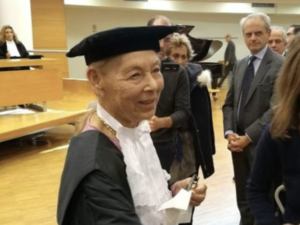REMEMBRANCE – Holocaust survivor Edith Bruck:
“Young people don’t know why they are against Israel”
 “This is a world in which hatred is rampant and people are listening less and less. But we must not stop striving to change it, because each of us can do something to correct distortions. Writing, testimony, raising our voices: the ways to make an impact, to leave a mark, are there.” On Friday, Hungarian-Italian writer and Holocaust survivor Edith Bruck turned 93. A survivor of deportation to the death camps in her youth, author of countless books and poems on trauma processing, she still plays a major role in public and intellectual debate. Since the October 7 attacks, Bruck has repeatedly denounced the exponential increase of antisemitism, warning several times before against its resurgence.
“This is a world in which hatred is rampant and people are listening less and less. But we must not stop striving to change it, because each of us can do something to correct distortions. Writing, testimony, raising our voices: the ways to make an impact, to leave a mark, are there.” On Friday, Hungarian-Italian writer and Holocaust survivor Edith Bruck turned 93. A survivor of deportation to the death camps in her youth, author of countless books and poems on trauma processing, she still plays a major role in public and intellectual debate. Since the October 7 attacks, Bruck has repeatedly denounced the exponential increase of antisemitism, warning several times before against its resurgence.
Speaking with Pagine Ebraiche, she confessed she is feeling “very sad and desolate, because the dramatic lesson of the past seems to have been understood much less” than it should have been. But she also entrusted this important date with a message: despite the many discouraging signals of the present, one must never stop combating hatred in every context, space, and place. She at least has no intention of raising the white flag. “I started bearing testimony from my first book, many years ago now. I will continue to do so if I have strength, as long as I am alive. It will never be enough, because unfortunately antisemitism always resurfaces and in many different forms, but that is no reason to give up.”
Bruck said she constantly follows the news, from the Middle East and beyond. She is struck by the impetus of young people protesting in Italian, European, and American university crying “From the river to sea,” invoking with this and other slogans the destruction of Israel. “They do not know what they are doing,” she said. “Unfortunately, since October 7 antisemitism turned into a tsunami, an increasingly darker cloud.”
To contrast this wave of hatred the writer does what she has always done: she intervenes on newspapers, writes articles and books. She recently delivered a new book, which includes many poems. In January, the publisher La nave di Teseo released I frutti della memoria (The fruits of memory), which collects letters and texts from students she met in schools. “I still receive many letters,” she remarked. “Many teachers also write to me. Fortunately, there are still people who listen and understand. It is fewer and fewer, but they exist and their words are a comfort. They are also an invitation: let’s keep fighting for a better society.” Young people are her preferred interlocutor, her first thought. “If adults have not yet learned from his misdeeds,” she writes in I frutti della memoria, “younger people, should try to be better than your predecessors and try to create a new peaceful, civilized coexistence and mutual respect with anyone and everywhere.” All it takes after all, she concludes, is “a drop of good”.
Above, Edith Bruck during the conferral of a honorary degree.
